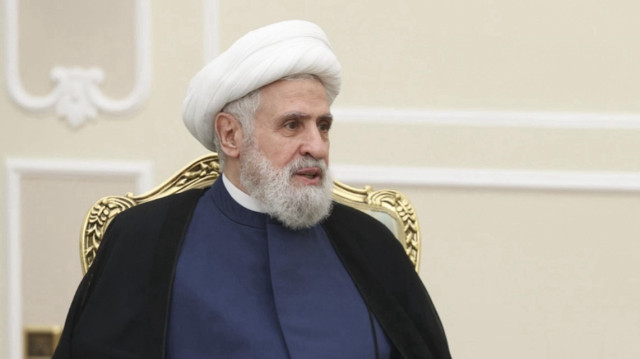
‘We cannot be asked to soften our stance or lay down arms while (Israeli) aggression continues,' Naim Qassem says
Hezbollah Secretary-General Naim Qassem said Sunday that his group remains open to peace, vowing not to disarm or back down from confronting Israel as the Israeli occupation of southern Lebanon continues.
In a televised address, Qassem rejected any calls for Hezbollah to disarm.
“We cannot be asked to soften our stance or lay down arms while (Israeli) aggression continues. The ceasefire agreement was supposed to halt Israeli attacks, but the opposite has occurred with full US support,” he said.
Lebanese authorities have reiterated in recent months the need to place all weapons under state control.In April, President Joseph Aoun said disarming Hezbollah would require dialogue and the right political conditions.
Qassem insisted that Israel must fulfill the first phase of the ceasefire agreement by ending air violations, halting hostilities, withdrawing fully from Lebanese territory, returning prisoners, and allowing reconstruction to begin.
Only then, he said, could steps toward implementing UN Security Council Resolution 1701 move forward.
UN Security Council Resolution 1701, adopted in 2006, calls for a permanent ceasefire and the establishment of a demilitarized buffer zone along the border.
International pressure, especially from the US, has increased on Lebanon to dismantle Hezbollah's military wing. But on Saturday, the Lebanese president told visiting UK Foreign Secretary David Lammy that Israeli occupation of Lebanese territory “complicates the state's ability to fully assert sovereignty and enforce exclusive control over weapons.”
On Friday, Hezbollah supporters staged a procession in Beirut's Zoqaq al-Blat area, where a group of armed men appeared during the march.
Participants carried weapons and chanted the name of former Hezbollah chief Hassan Nasrallah, who was assassinated by Israel in September.
Israel launched a wide-scale assault on Lebanon on Oct. 8, 2023, that escalated into a full-scale war by Sept. 23, 2024. The conflict has killed more than 4,000 people, wounded over 17,000, and displaced nearly 1.4 million, according to official data.
Israeli forces have conducted near-daily attacks in southern Lebanon, claiming to target Hezbollah's activities despite the November between Israel and Lebanon. The truce ended months of cross-border warfare between Israel and the Lebanese resistance group.
Lebanese authorities have reported nearly 3,000 Israeli violations of the truce, including the deaths of at least 225 people and injuries to more than 500, since the agreement was signed.
Under the ceasefire deal, Israel was supposed to fully withdraw from southern Lebanon by Jan. 26, but the deadline was extended to Feb. 18 after Tel Aviv refused to comply. Israel still maintains a military presence at five border outposts.







